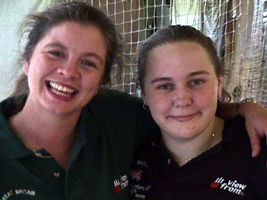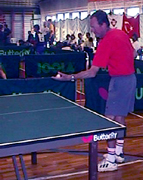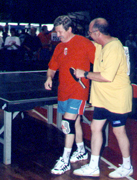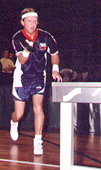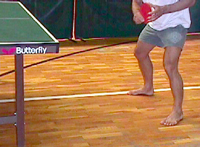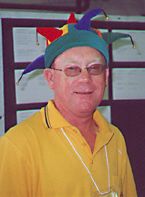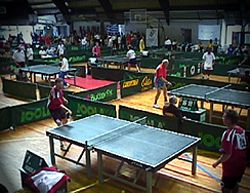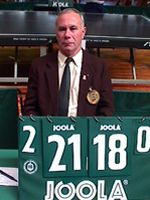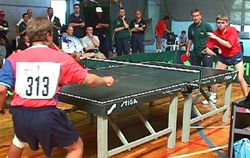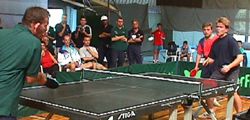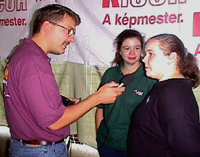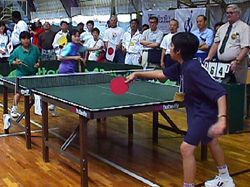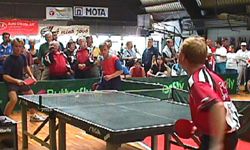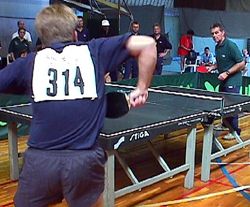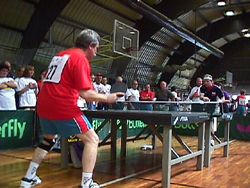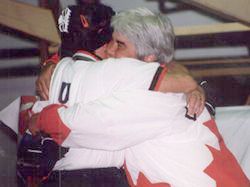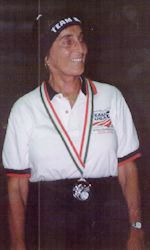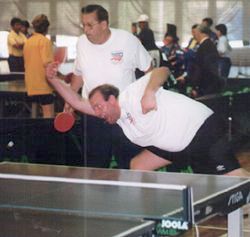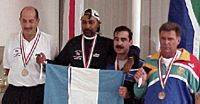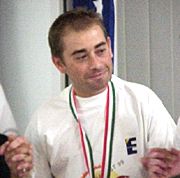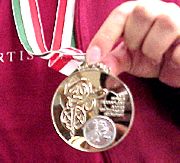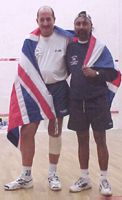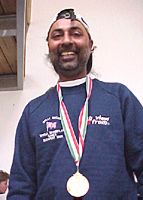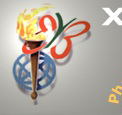 |
 |
| 5 Sunday |
| 6 Monday |
| 7 Tuesday |
| 8 Wednesday |
| 9 Thursday |
| 10 Friday |
| 11 Saturday |
| 12 Sunday |
| 1997
World Games, Sydney |
| 1999
Winter World Games, Snowbird |
| TransWeb's Athletics Index |
TransWeb |
__
|
||||||||||||||||||||||||||||
|
Bringing Out the Best |
|
|
LISTEN
TO AUDIO, via Interview
with Ludovic LeBreton of France |
Interview
with Great Britain's Peter Kramer 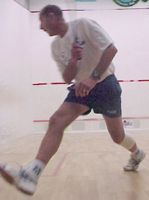 |
|
The Griff Squash and Fitness Center is a spacious new building attached to the Hotel Griff. Several miles from the Danube on the Buda side of Budapest, the Squash venue for these Transplant Games was wonderful. Outside, yellow commuter trains amble down the center of a bumpy street whose tired cobblestones have stood for generations. The ever-present smell of diesel exhaust mingling with cigarette smoke combines with the noise of two-cycle engines to complete the setting of a standard Budapest street scene. Inside the Griff the setting is drastically different. Marble columns reach skyward from the playing level which is easily viewed through glass walls both on the main floor and the loft above for spectators. Workout and weight equipment seem to get constant use on the upper level where the laughter and muscular effort of young people mix on the balcony overlooking the squash courts. |
|
| Beginning with a field of dozens of competitors the elimination squash tournament began. Favored in the mens division was Ludovic Le Breton from France. A squash instructor who owns his own squash club, Le Breton was confident from the start. "It was easy," Le Breton said with a wink following the semifinals. In the senior men's division Team Great Britain's Peter Kramer (left, in photo at right) and Amarjit "Ami" Sehmbi were set to do battle for the gold. Kramer, 51, took the bronze in Sydney where the TransWeb webcast team met him at the tennis venue. Kramer's liver transplant over four years ago has given him a new lease on life. A self-employed retail salesman, Kramer said "I was playing squash right up until my transplant in April '95 and was back on court eight weeks afterwards." Kramer, who normally competes in the veterans division, was forced to drop down to the seniors due to a lack of veterans in Budapest. |
"I was playing squash right up until my transplant in April '95 and was back on court eight weeks afterwards."
|
| In preparation for the finals, lights were dimmed in all of the other courts in the building and crowd grew to around a hundred people watching the every move of the competitors. There were officials, video crews, teammates and passers-by crowding the floor level. Laughing and cheering, local kids, teammates and photographers leaned over the balcony railing to revel in the competition. The winner would take the best of three games, using American scoring. In the women's division, Eilleen Moxley of Team Great Britain handily took the gold. The silver medal was issued to Martina Schmidt (in photo at right) of Germany. TransWeb last met Martina in Sydney and she is thrilled to be here in Budapest. In the first game of the men's senior division final, Ami came out strong quickly reaching 6-0. Kramer then rallied for 5 points to Ami's 7. Ami then came back strong to win the first game at 15-8. The second game began even through 6 points before Ami went ahead to win 15-5. | 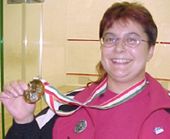 |
| In the men's division, Australia's Darryl Frankham and France's Le Breton struck out with the smiles and comaraderie which are so pervasive at these Games. Le Breton's quiet confidence turned quickly to a combination of fierce competition and a clear love of the game. Le Breton, quickly reaching 11-3, began to relax and really work the crowd. His infectious smile thrilled the spectators as he hit an absolutely unreachable shot and then pointed out the ball as if to say "why don't you hit that ball way over there" to Frankham as it flew by to win the point for Le Breton. "You think you hit a winner and then he just picks it up with ease," said Frankham after the first game. In the second game, Le Breton charged ahead to 5-0. The Aussie, pleased with the demonstration he was being given, smiled at the artistic playing of Le Breton. The Frenchman found himself gently pushing the Aussie aside in order to reach a shot. A rousing cheer went up each time Frankham scored. Le Breton went ahead to win 15-5 to take the gold home to France. |  |
|
"This gold medal is for my Dad..."
|
The medal presentation was inside the Griff. Shouts and cheers echoed through the building as the winning countries' flags slowly raised to the strains of anthems through the loudspeakers. Hugging one another, winners and losers alike congratulated one another on attendance, athletic success and life. After receiving his gold medal, Ami of Great Britain stopped for a moment while he had the attention of the crowd. "This gold medal is for my Dad. He taught me how to play this game and died just two months ago. I am really happy but I'm a little sad, too." More hugs, cheers and good wishes filled the room again. These Transplant Games bring out the best in all of us, wherever we meet. |
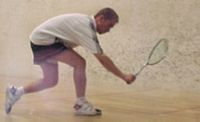 |
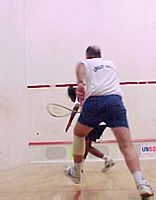 |
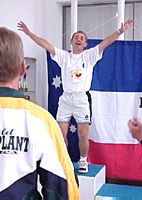 |
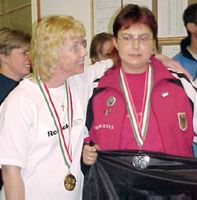 |
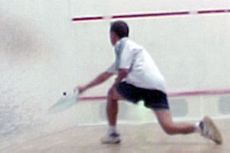 |
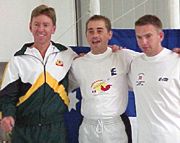 |
